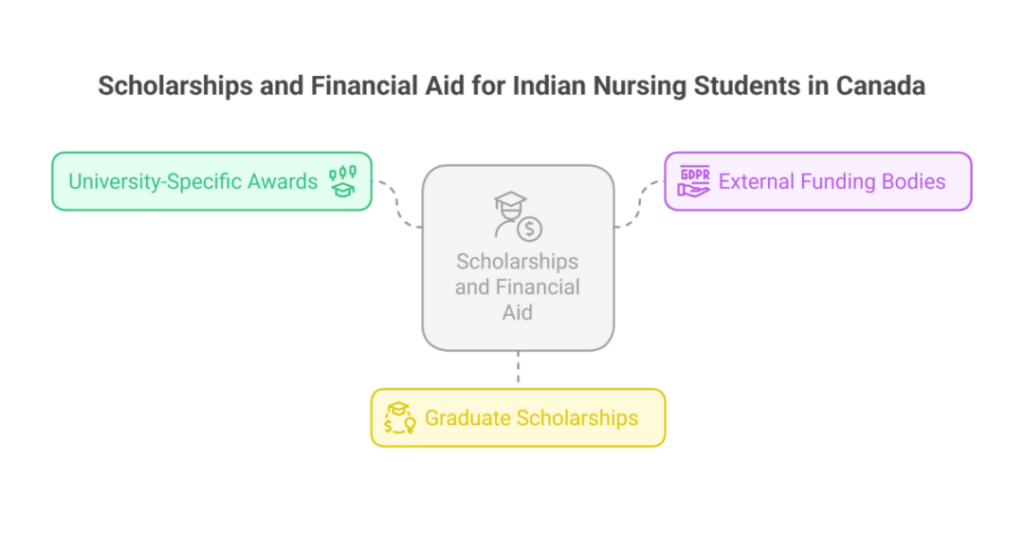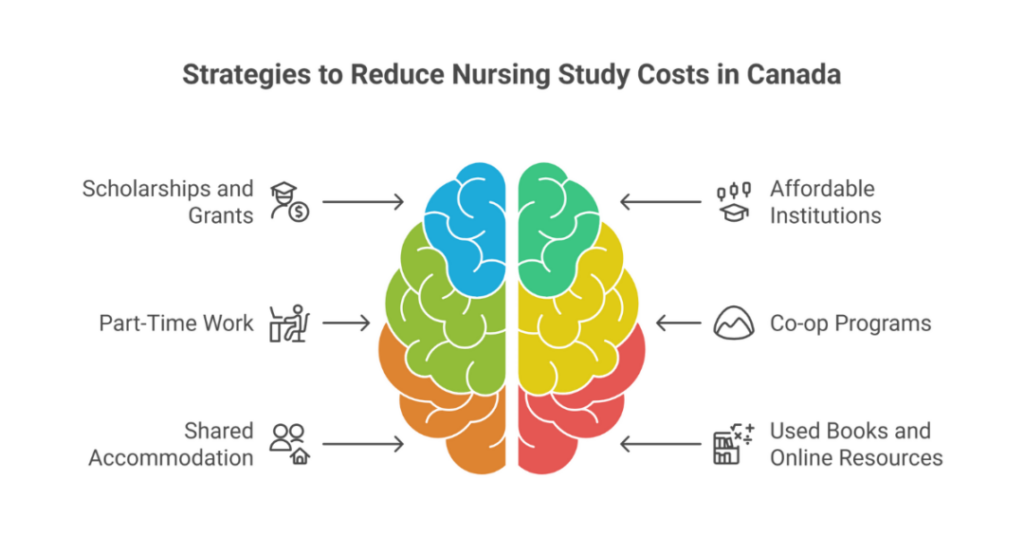13 August 2025
6 minutes read
Cost of Studying Nursing in Canada for Indian Students

Key Takeaways
- Cost of studying nursing in Canada ranges from ₹7–27 lakh for tuition plus ₹9–14 lakh for living expenses annually.
- Scholarships, budget-friendly colleges, co-op programs, and part-time work help reduce overall costs.
- Strong demand, salaries of CAD 60,000–90,000, and PR pathways make a nursing degree in Canada a high-ROI investment.
Studying nursing in Canada for Indian students is a dream, but the cost of studying nursing in Canada can be a shock. From tuition fees for a BSc Nursing in Canada at top universities like the University of Toronto or University of Alberta to living expenses, costs add up quickly.
Many international students underestimate expenses beyond the nursing program. Yet, with scholarships, part-time jobs, and smart budgeting, pursuing a Bachelor of Science in Nursing or Masters in Nursing in Canada remains achievable and rewarding.
Why Indian Students Choose Canada for Nursing Studies?
Indian students choose to study nursing in Canada for its top universities like the University of Toronto and University of Alberta, globally recognized BSc Nursing in Canada programs, and high-paying jobs after nursing.
While the cost of studying nursing in Canada and cost of living in Canada can be high, scholarships and part-time work make it manageable. From bachelor of science in nursing to masters in nursing, nursing colleges in Canada offer quality education, modern facilities, and strong career opportunities for international students.
Average Cost of Studying Nursing in Canada for Indian Students
The cost of studying nursing in Canada for Indian students varies depending on the nursing program, university, and province. Whether you plan to pursue a BSc Nursing in Canada, a Bachelor of Science in Nursing, or a Masters in Nursing, tuition fees differ between top universities in Canada like the University of Toronto, University of Alberta, and other leading nursing schools in Canada.
While the investment is significant, Canada’s high-quality nursing education and career opportunities for nurses in Canada make it worthwhile for international students.
| University / College | Nursing Program | Annual Tuition Fee (CAD) | Approx. Fee in INR |
|---|---|---|---|
| University of Toronto (Bloomberg Faculty of Nursing) | Bachelor of Science in Nursing (BScN) | 42,000 – 45,000 | ₹25–27 lakh |
| University of Alberta (Faculty of Nursing) | BSc in Nursing | 29,000 – 32,000 | ₹17–19 lakh |
| McGill University | Bachelor of Nursing | 22,000 – 25,000 | ₹13–15 lakh |
| University of British Columbia | Bachelor of Science in Nursing | 30,000 – 34,000 | ₹18–21 lakh |
| McMaster University | Bachelor of Science in Nursing | 28,000 – 31,000 | ₹16–18 lakh |
| Dalhousie University | BSc Nursing | 23,000 – 26,000 | ₹14–16 lakh |
| Western University | Bachelor of Science in Nursing | 28,000 – 30,000 | ₹16–17 lakh |
| University of Ottawa | BSc Nursing | 27,000 – 29,000 | ₹16–17 lakh |
| Memorial University of Newfoundland | Bachelor of Nursing | 12,000 – 15,000 | ₹7–9 lakh |
| University of Calgary | Bachelor of Nursing | 20,000 – 23,000 | ₹12–14 lakh |
Additional Expenses Beyond Tuition
While tuition is the biggest part of the cost of studying nursing in Canada, international students must also budget for living costs, insurance, and other essentials. Whether you’re pursuing a BSc Nursing course in Canada, a Master of Nursing, or a PhD in Nursing, these expenses can significantly impact your overall budget when you study in Canada.
| Expense Category | Average Annual Cost (CAD) | Approx. Cost in INR | Notes |
|---|---|---|---|
| Accommodation | 8,000 – 12,000 | ₹4.8–7.2 lakh | Varies by city and housing type; on-campus is often cheaper |
| Food & Groceries | 3,000 – 4,500 | ₹1.8–2.7 lakh | Monthly groceries average CAD 250–375 |
| Transportation | 1,000 – 1,500 | ₹60,000–90,000 | Public transit passes; some universities for nursing offer discounts |
| Health Insurance | 600 – 900 | ₹36,000–54,000 | Mandatory for international students to study nursing in Canada |
| Books & Supplies | 1,000 – 1,500 | ₹60,000–90,000 | Includes nursing lab kits and course materials |
| Personal Expenses | 2,000 – 3,000 | ₹1.2–1.8 lakh | Clothing, phone bills, leisure |
| Miscellaneous Fees | 500 – 1,000 | ₹30,000–60,000 | Student association, lab fees, and campus services |
| Total Additional Costs | 16,100 – 24,400 | ₹9.66–14.64 lakh | Adds substantially to the cost of studying nursing in Canada |
Scholarships and Financial Aid for Indian Students in Canada
The cost of studying nursing in Canada can be high for international students, but many universities for nursing and organizations offer scholarships for international students to ease the burden.

Whether you’re pursuing a BSc Nursing course in Canada, a Master of Nursing, or even a PhD in Nursing, financial aid can make your dream to study in Canada more affordable.
- University of Toronto – Bloomberg Faculty of Nursing Awards: Supports students in the Bachelor of Science in Nursing and Master of Nursing programs.
- University of Alberta – Faculty of Nursing International Student Awards: Merit-based scholarships for bachelor of nursing in Canada candidates.
- McMaster University Nursing Scholarships: Available for BSc in Nursing in Canada students with high academic performance.
- Canadian Nursing Foundation Scholarships: Open to nursing in Canada for international students across undergraduate and graduate levels.
- Vanier Canada Graduate Scholarships: Prestigious award for PhD in Nursing and other research fields in top universities for nursing.
- Ontario Graduate Scholarship (OGS): For students enrolled in a degree in nursing in Canada, including MSc Nursing in Canada programs.
- College and University Entrance Awards: Many nursing colleges in the world, including colleges in Canada that offer BSc programs, provide entry-level awards to international students to study nursing.
- External Funding Bodies: Organizations like Shastri Indo-Canadian Institute offer grants for courses in Canada for Indian students in the field of nursing.
Ways to Reduce the Cost of Studying Nursing in Canada
The cost of studying nursing in Canada can feel overwhelming for international students, but with the right approach, you can make it more affordable.

Whether pursuing a BSc Nursing course in Canada, a Master of Nursing, or a PhD in Nursing, these strategies can help you manage expenses while you study in Canada.
- Apply for Scholarships and Grants
Many universities for nursing in Canada and external bodies offer scholarships for international students to study a degree in nursing. This can significantly reduce nursing fees in Canada for both undergraduate and postgraduate programs. - Choose Affordable Institutions
Instead of only targeting the top universities for nursing, explore quality yet budget-friendly nursing colleges in the world, like Memorial University or colleges in Canada that offer lower tuition fees. - Work Part-Time While Studying
As a nurse in Canada, you can work up to 20 hours a week during semesters. These jobs help cover living costs and build experience for jobs after nursing in Canada. - Opt for Co-op or Internship Programs
Many nursing programs in Canada and bachelor of nursing in Canada courses include paid co-op placements. These not only lower the cost of studying but also improve your career in nursing prospects. - Share Accommodation and Save on Living Costs
Housing is a major part of the cost of living in Canada. Sharing with other students in Canada can cut rent by up to 50%, freeing up funds for course-related expenses. - Buy Used Books and Online Resources
Instead of purchasing new materials for your BSc in Nursing in Canada or Master of Nursing, opt for second-hand books or free online resources from nursing universities and public libraries.
Return on Investment: Career Prospects After Graduation
The cost of studying nursing in Canada may seem high at first, but the return on investment is strong for international students who complete a nursing course in Canada. Graduates with a degree in nursing from top universities for nursing enjoy excellent job prospects, competitive salaries, and opportunities for career growth in the field of nursing.
Whether you pursue a BSc Nursing course in Canada, a Master of Nursing, or a PhD in Nursing, Canada’s healthcare sector offers stable employment and pathways to permanent residency.
- High Demand Across Canada
Jobs in Canada for nurses remain in demand, with hospitals, clinics, and community healthcare programs actively hiring bachelor of nursing in Canada and MSc Nursing in Canada graduates. - Attractive Salary Packages
A nursing degree in Canada can lead to average annual salaries between CAD 60,000–90,000, depending on specialization and province. Canadian nursing salaries often increase with experience and advanced education. - Pathway to Permanent Residency
Many courses in nursing in Canada lead to occupations on Canada’s in-demand list, making it easier for international students to study and later transition to PR status. - Opportunities for Specialization
Graduates can pursue courses after BSc Nursing like nurse practitioner programs, midwifery, or short nursing courses in Canada to further boost employability. - Global Career Mobility
A bachelor’s degree in nursing or master’s in nursing in Canada from the best universities in Canada is recognized worldwide, allowing graduates to work in multiple countries.
Conclusion
The cost of studying nursing in Canada is an investment that pays off with world-class education, global recognition, and promising jobs in Canada. From a BSc Nursing course in Canada to advanced degrees, the journey demands careful planning to balance tuition, living costs, and career goals.
That’s where Ambitio comes in. Your expert partner in profile building, university selection, and application success. Ready to turn your dream into a career reality? Let’s craft your perfect study abroad plan, maximize scholarships, and make Canada your next destination. Start with Ambitio Elite today. Your nursing career begins here!
FAQs
What are the requirements for international students to apply for a BSc Nursing program in Canada?
Requirements typically include a high school diploma, proficiency in English or French, and prerequisite courses in sciences. Some universities may also require standardized test scores or a personal interview.
Can international nursing students work while studying in Canada?
Yes, international students are allowed to work part-time during their studies and full-time during scheduled breaks, subject to certain conditions.
Is it possible to stay in Canada and work after completing a nursing degree?
Graduates may apply for a Post-Graduation Work Permit, allowing them to work in Canada for up to three years after graduation. This experience can also be beneficial for those seeking permanent residency.
How does the cost of studying nursing in Canada compare to other countries?
While the costs are competitive with other top education destinations like the US, UK, or Australia, Canada is often preferred for its high-quality education, multicultural environment, and post-graduation opportunities.

You can study at top universities worldwide!
Get expert tips and tricks to get into top universities with a free expert session.
Book Your Free 30-Minute Session Now! Book a call now




























